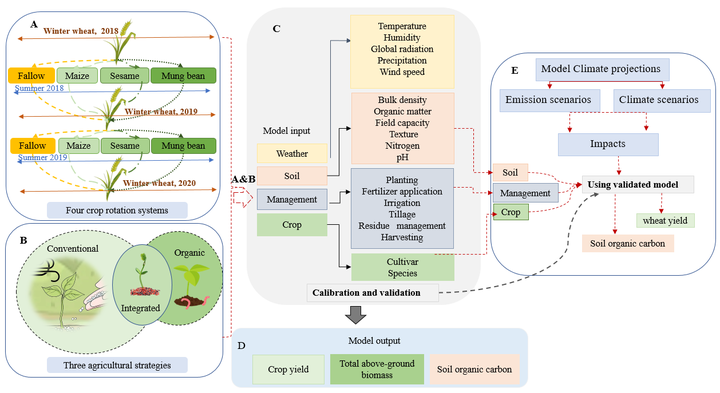
Full title
Spatially-explicit crop modelling to understand the potential of different agricultural managements to improve carbon sequestration and crop yield
General goals
Soil organic carbon (SOC) is one of the most important indicator to represent soil quality and productivity. The process of Carbon sequestration in agricultural soils is complex and depends on factors like soil properties, agricultural management practices, and climatic variables. Understanding the long-term impact of these inter-related factors at regional scales using field measurements is costly and in most cases even impossible due to highly variable dynamic of weather conditions, soil heterogeneity, and slow change in carbon cycle.
Objective 1) exploring the individual and combined effects of three types of agricultural management practices as: crop residual management, combinations of organic and inorganic fertilizer applications, crop rotations on SOC and wheat yields.
Objective 2) Crop modeling simulations to assess the effects of these practices for 20-years during historical period i.e. upscaling the analysis to regional scale
Related publication
Gorooei A, Srivastava A, Jahanbakhshi F, Ahmadi A, Aynehband A, Nendel C, Gaiser T, Kamali B. Projected climate change impacts on future soil organic carbon dynamics and wheat yields under different agricultural management strategies for two contrasting environments in Iran, under review
Gorooei A, Gaiser T, Aynehband A, Rahnama A, Kamali B, 2023, The effect of farming management and crop rotation systems on Chlorophyll content, dry matter translocation, and grain quantity and quality of wheat (Triticum aestivum L.) grown in a semi-arid region of Iran. Agronomy, 13, 1007. DOI:10.3390/agronomy13041007
Gorooei A, Aynehband A, Rahnama A, Gaiser T, Kamali B, 2023. Cropping systems and agricultural management strategies affect soil organic carbon dynamics in semi-arid regions, Front. Sustain. Food Syst., DOI: 10.3389/fsufs.2022.1016000
Partners
- Prof. Dr. Amir Aynehband, Shahid Chamran University of Ahvaz, Department of Production Engineering and Plant Genetics
Funded by
German Research Foundation (DFG)